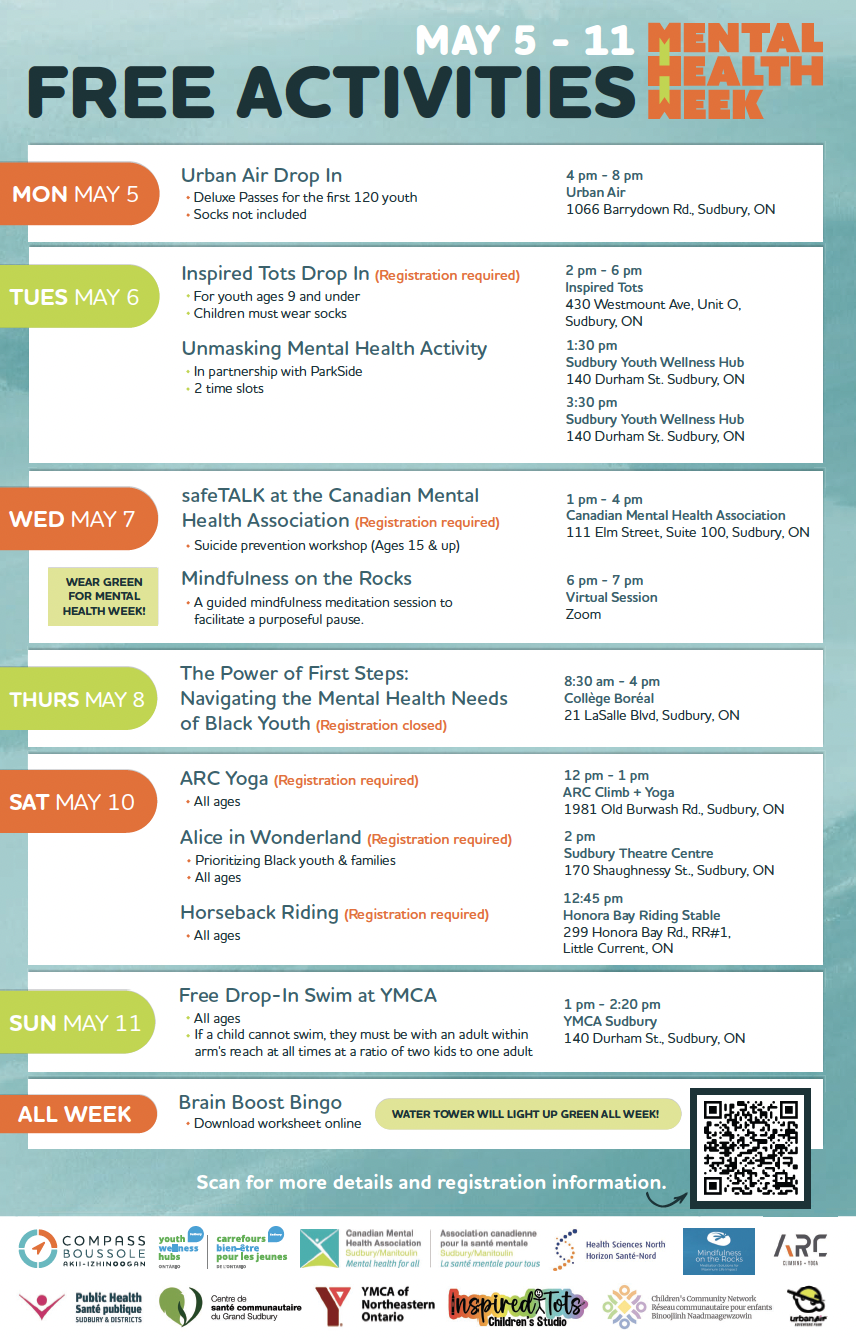Children’s Mental Health Week 2025 ☀️
Children’s Mental Health Week is an annual event dedicated to raising awareness about the importance of children’s mental health and well-being. It typically focuses on promoting positive mental health, reducing stigma, and encouraging conversations about mental health issues among children, families, and educators.
Key Aspects of Children’s Mental Health Week:
- Awareness: The week aims to inform parents, educators, and the community about the mental health challenges children face.
- Activities: Various activities are organized, including workshops, educational sessions, and fun events to engage children and families in discussions about mental health.
- Support: It provides resources for families, teachers, and children to better understand and support mental health needs.

Mental Health Week 2025 Theme:
Unmasking Mental Health
Living with a mental health or substance use challenge is hard enough; masking can make it even harder. Living with mental health challenges often forces people to hide behind a “mask” to protect themselves from judgment and discrimination. But the heavier the stigma, the heavier the mask becomes, and the more isolated we feel.
This May 5-11, we’re encouraging people across Canada to look beyond the surface and see the whole person. By embracing honesty and vulnerability, we open the door to deeper connections and the mental health benefits that come with it. In doing so, we can create a ripple effect of courage and understanding across the country.
Guidance for Parents and Guardians
Creating a supportive environment for children’s mental health is crucial for their overall well-being and development. By implementing strategies, parents can create a nurturing environment that supports their children’s mental health, helping them develop the skills they need to navigate challenges and thrive emotionally. Here are several ways parents can foster such an environment:
Open Communication
Encourage Dialogue: Create a safe space where children feel comfortable expressing their thoughts and feelings without judgment.
Active Listening: Pay attention to what your child is saying, validate their feelings, and respond empathetically.
Emotional Awareness
Teach Emotional Literacy: Help children recognize and label their emotions. Use books or stories to discuss feelings and coping strategies.
Model Emotional Expression: Show your child how you manage your emotions in healthy ways, demonstrating that it’s okay to feel a range of emotions.
Helpful Websites:
School Mental Health Ontario Website: https://smho-smso.ca/ School Mental Health Ontario aims to create a culture of mental health awareness and support in schools, ensuring that students have access to the resources and support they need to thrive emotionally and academically.
The Kids’ Health Hub Website: kidshealthhub.ca Provides resources focused on children's health, including emotional well-being and mental health resources for parents and educators
PBS Parents Website: pbskids.org/parents Offers articles, activities, and videos focused on emotional development and literacy for children.
Greater Good Science Center (UC Berkeley) Website: greatergood.berkeley.edu Provides articles, research, and activities focused on emotional intelligence, resilience, and well-being for children and families.
Routine & Structure
Establish Routines: Consistent daily routines provide stability, helping children feel secure and understand what to expect.
Set Clear Expectations: Communicate family rules and expectations clearly, which can help children feel more confident and secure.
Promote Positive Relationships
Encourage Friendships: Support your child in building friendships and social connections, which are vital for emotional support.
Family Bonding: Spend quality time together as a family through activities, meals, or game nights to strengthen relationships.
Healthy Lifestyle
Balanced Nutrition: Provide healthy meals and snacks to support physical and mental well-being.
Physical Activity: Encourage regular physical activity, which can help reduce anxiety and improve mood.
Limit Screen Time
Set Boundaries: Establish reasonable limits on screen time and encourage engaging in outdoor or creative activities instead.
Monitor Content: Be aware of what your child is watching or playing, ensuring it is age-appropriate and positive.
Encourage Independence
Promote Problem-Solving: Allow your child to make decisions and solve problems on their own, which fosters resilience and confidence.
Respect Boundaries: Give children space to explore their interests and develop their identity.
Teach Coping Skills
Introduce Relaxation Techniques: Teach your child methods for managing stress, such as deep breathing, mindfulness, or positive visualization.
Encourage Hobbies: Support your child's interests and hobbies, which can provide a productive outlet for emotions.
Recognize Signs of Distress
Be Observant: Pay attention to changes in behavior, mood, or academic performance, which may indicate underlying mental health issues.
Seek Help When Needed: If you notice persistent signs of distress, consider consulting a mental health professional for guidance and support.
Foster a Growth Mindset
Encourage Resilience: Teach your child that setbacks are a part of life and emphasize the importance of learning from failures.
Celebrate Efforts: Acknowledge and celebrate their efforts and achievements, reinforcing a positive self-image.
Activities for Families and Classrooms
These activities can help strengthen bonds, promote understanding of mental health, and create a supportive environment for children during Mental Health Week.
Mindfulness & Relaxation Sessions
- Family Yoga: Organize a family yoga session in a local park or at home to promote relaxation and connection.
- Meditation Workshops: Host guided meditation sessions for families to practice mindfulness together.
Creative Expression
- Arts and Craft Day: Set up an art station where kids can create artworks that express their feelings. Use various materials like paints, clay, and collages.
- Storytelling Night: Encourage families to create and share stories that focus on emotions, resilience, or overcoming challenges.
Nature Activities
- Nature Walks: Plan a hike or nature walk to explore the outdoors while discussing the importance of mental well-being and noticing the beauty of nature.
- Gardening Projects: Start a small garden or plant flowers together, teaching kids about nurturing and growth.
Physical Activities
- Sports Day: Organize a day of fun sports and games, promoting teamwork, physical activity, and healthy competition.
- Dance Party: Host a family/school or classroom dance-off where everyone can express themselves through movement and music.
Kindness Initiatives
- Kindness Challenge: Create a list of simple acts of kindness that families and classrooms can complete throughout the week, such as writing positive notes for each other or helping a friend, teacher or student.
- Gratitude Jar: Fill a jar with notes about things you/kids/families are grateful for and read them together at the end of the week.
Game Day/Night
- Board Games and Puzzles: Spend an evening playing board games or solving puzzles together, fostering teamwork and communication.
- Mindfulness Games: Play games that promote mindfulness, such as "Feelings Charades" where players express emotions through actions.
Journaling Together
- Journaling Time: Set aside time each day to write in journals. Encourage sharing thoughts and feelings, promoting open communication.
Cooking Together
- Healthy Cooking Classes: Prepare meals together as a family, emphasizing the importance of nutrition for mental health.
- Bake-Off Challenge: Host a fun baking competition where family members and/or classrooms can create healthy treats.
Baking A Kindness Cake
The term "kindness cake" emerged in recent years, inspired by movements promoting acts of kindness. This resurgence aligns with the SCDSB focus on mental health and community well-being, where the simple gesture of baking and sharing a homemade cake symbolizes care and connection. The tradition continues to thrive as a meaningful way to spread joy and strengthen bonds across diverse communities.
Kindness Cake Recipe: Click Here

